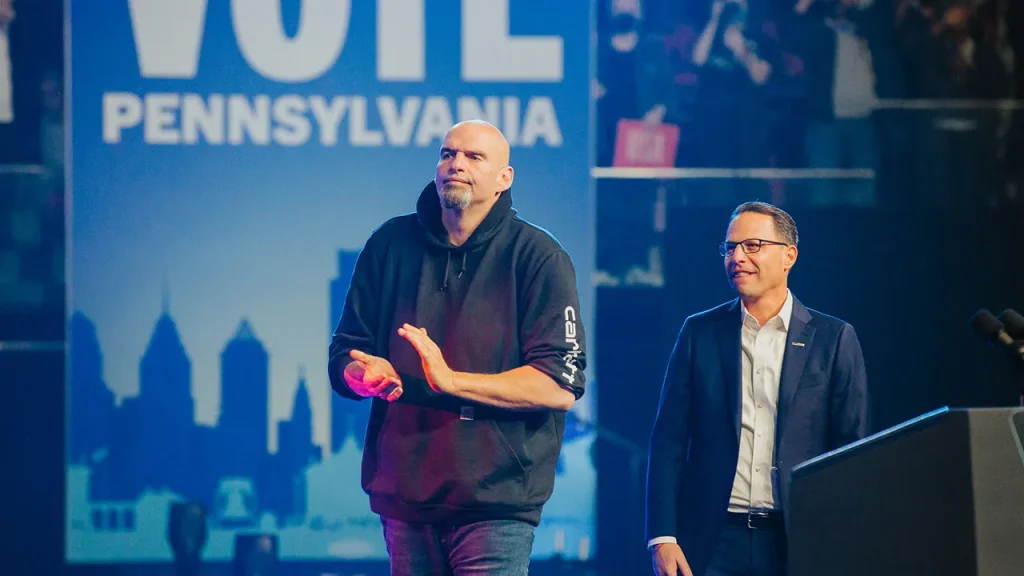Fetterman’s Candid Revelations: A Political Relationship Gone Sour
Senator John Fetterman’s newly published memoir, “Unfettered,” provides an intimate glimpse into the deterioration of his relationship with Pennsylvania Governor Josh Shapiro. The book reveals a particularly tense moment during a Pennsylvania Board of Pardons meeting when Fetterman, then serving as the state’s lieutenant governor, uttered a profanity-laced comment about Shapiro after he delivered what Fetterman considered a “very long-winded and unnecessary” speech. The outburst came during a Zoom hearing regarding the potential commutation of sentences for Lee and Dennis Horton, brothers who had been convicted of second-degree murder in connection with a fatal 1993 robbery and shooting. Shapiro had expressed concerns about missing transcripts from the siblings’ original trial, which triggered Fetterman’s angry response. This heated exchange marked a significant turning point in what would become a growing rift between two of Pennsylvania’s most prominent Democratic politicians.
The memoir candidly recounts how the tension escalated to the point where Fetterman threatened to challenge Shapiro in the 2022 gubernatorial primary. During a private meeting, Fetterman presented Shapiro with two possible scenarios: either they would compete against each other for governor, or Fetterman would pursue a Senate seat while Shapiro ran for governor. “I had no interest in friction, only in what I felt was justice,” Fetterman writes, revealing his preference for the latter option. The book describes how Shapiro’s team later reached out to Fetterman, requesting that he retract his statements and deny rumors about their private meeting – a request Fetterman firmly refused. Despite their differences, the Horton brothers’ case eventually saw resolution in December 2020 when the board voted to commute their sentences. In a meaningful gesture that underscored Fetterman’s commitment to their cause, he later invited Dennis Horton to be his guest at the 2023 State of the Union address.
The fundamental disagreement between Fetterman and Shapiro centered on their differing philosophies regarding the parole and pardon system. Fetterman writes with conviction about his approach: “I truly believed with all my heart that nobody I ever supported for a pardon was a danger to society. I was willing to stake my political career on it.” In contrast, he perceived Shapiro as being “far more cautious,” and eventually came to believe that Shapiro’s hesitancy wasn’t merely caution but politically motivated. This ideological divide manifested in their voting patterns, with Fetterman recalling one particularly frustrating meeting where Shapiro voted against parole in 12 of 15 cases – a decision that allegedly caused Fetterman to break his reading glasses in frustration. Fetterman theorizes in his memoir that Shapiro’s reluctance stemmed from “a fear that someone whose sentence he’d commuted would go on to commit terrible violence on the outside,” suggesting that political ambition rather than case-specific facts drove many of Shapiro’s decisions.
Despite the dissolution of their professional relationship, Fetterman expresses a certain nostalgia and respect for their earlier interactions. “I sincerely wish him the best,” he writes about Shapiro. “He is a credit to the state and may one day be a credit to the country. I remember fondly the days when we were nobodies trying to climb the ladder. Even if we no longer speak.” This bittersweet reflection offers a glimpse into the complicated nature of political relationships, where shared ambitions can both unite and divide. The memoir captures how two politicians with seemingly aligned values and party affiliations can diverge significantly on issues of principle, particularly when those principles intersect with political calculations and public safety concerns. The tension between justice-oriented reform and political risk management emerges as a central theme in their fractured relationship.
The fallout between these two Pennsylvania Democrats stands in contrast to Fetterman’s current position on Capitol Hill, where he has sometimes found himself at odds with members of his own party for different reasons. Since taking office as a U.S. Senator, Fetterman has occasionally broken with Democratic orthodoxy, expressing willingness to work with the Trump administration and maintaining strong support for Israel – positions that have created friction with some progressive colleagues. This willingness to cross partisan lines suggests that Fetterman’s approach to politics continues to be guided by personal conviction rather than strict party loyalty, a characteristic that was evident in his passionate advocacy for criminal justice reform during his time on the Pennsylvania Board of Pardons.
Fetterman’s memoir provides a rare unvarnished look at the personal tensions that often simmer beneath the surface of political collaborations. The deterioration of his relationship with Shapiro serves as a compelling case study in how policy disagreements can evolve into personal animosity, especially when deeply held values are at stake. The story also illuminates the complex ethical considerations surrounding criminal justice reform, where decisions about pardons and commutations carry significant implications for public safety, individual liberty, and political careers. Through his candid recounting of these events, Fetterman offers readers insight not only into his own political journey but also into the difficult balancing act that elected officials must perform when navigating between their personal convictions and their political futures. As both men continue their careers in public service – Fetterman in the Senate and Shapiro as governor – their divergent paths serve as a reminder of how even those who share party affiliation can find themselves fundamentally at odds over questions of justice and governance.


